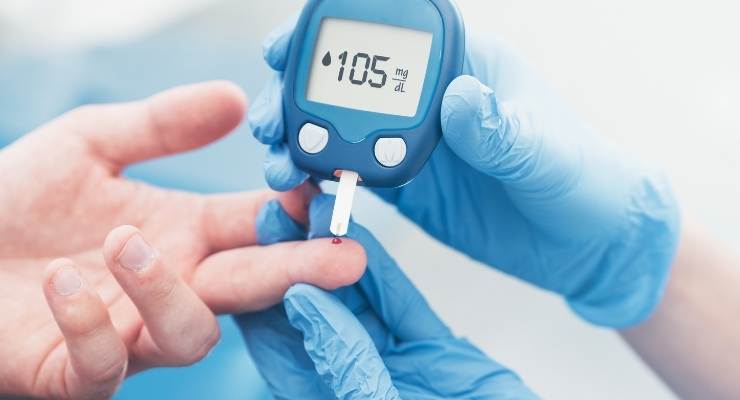09.08.22
A new study protocol has been published detailing a trial initiated by Scotmann Pharmaceuticals, Pakistan, a partner of Gnosis by Lesaffre, which will involve a large-scale, multi-center trial to examine the impact of vitamins K2 and D3, along with an oral anti-diabetic called Empagliflozin on subjects with diabetes. Gnosis by Lesaffre’s vitamin K2, derived in the MK7 form through fermentation, will be used for the study.
Globally, there were 437.9 million cases of type 2 diabetes in 2019, with an age-standardized point prevalence of 5,282.9 per 100,000 people, representing a 49% increase since 1990. The trial, called VETA (Vitamin D, K2 plus Empagliflozin combination in Type Two Diabetes Mellitus) is a six month prospective, randomized, controlled, open label, multicenter trial conducted in collaboration with the University of Health Science Lahore and the Pakistan Society of Internal Medicine. The study will enroll 340 participants between the ages of 40 and 60 who have had type 2 diabetes for at least 10 years.
The participants will be allocated to either a control group (which will continue taking an oral anti-hyperglycemic), an interventional group taking Empagliflozin along with a diet and exercise plan, or an interventional group taking Empagliflozin along with diet and exercise along with 2,000 IUs of vitamin D3 and 100 mcg of vitamin K2. The doses of both the Empagliflozin and D3 + K2 soft gels will be taken once daily.
The main goals of the study are to examine: hyperglycemic parameters, such as HbA1C, fasting blood sugar, and random blood sugar; hyperlipidemic parameters, such as HDL-C, LDL-C, and triglycerides; improvements in Diabetic Quality of Life tests; and effects on arterial calcification markers.
“The idea is to follow the holistic approach guidelines for the management of T2DM,” said Dr. Syeda Saba Alsam, head of medical affairs and research with Scotmann Pharmaceuticals, Pakistan, noting that baseline screening of serum 25(OH)D3 levels would be done on all patients. “Since Vitamin D deficiency is highly prevalent in this cohort and a typical Pakistani diet lacks Vitamin K2, we are exploring the potential beneficial effects of these two micronutrients in Diabetic patients.”
“While treatment is crucial for diabetes, the proper nutrient intake is also important for this group of patients,” said Sophie Legrain, Gnosis by Lesaffre’s director of R&D. “Deficiency of vitamin D is globally recognized, however, the research suggests that vitamin D3 should be combined with vitamin K2 for synergistic impact. Further, it has been shown that vitamin K2 supplementation can effectively improve clinical features of diabetes.”
Legrain noted a study in which vitamin K2 intake specifically produced a 7% reduction in type 2 diabetes risk with each 10 mcg increment.
“It is exciting to see our partner exploring the impact K2 and D3 could have for patients adding it to their therapy,” Legrain said.
Globally, there were 437.9 million cases of type 2 diabetes in 2019, with an age-standardized point prevalence of 5,282.9 per 100,000 people, representing a 49% increase since 1990. The trial, called VETA (Vitamin D, K2 plus Empagliflozin combination in Type Two Diabetes Mellitus) is a six month prospective, randomized, controlled, open label, multicenter trial conducted in collaboration with the University of Health Science Lahore and the Pakistan Society of Internal Medicine. The study will enroll 340 participants between the ages of 40 and 60 who have had type 2 diabetes for at least 10 years.
The participants will be allocated to either a control group (which will continue taking an oral anti-hyperglycemic), an interventional group taking Empagliflozin along with a diet and exercise plan, or an interventional group taking Empagliflozin along with diet and exercise along with 2,000 IUs of vitamin D3 and 100 mcg of vitamin K2. The doses of both the Empagliflozin and D3 + K2 soft gels will be taken once daily.
The main goals of the study are to examine: hyperglycemic parameters, such as HbA1C, fasting blood sugar, and random blood sugar; hyperlipidemic parameters, such as HDL-C, LDL-C, and triglycerides; improvements in Diabetic Quality of Life tests; and effects on arterial calcification markers.
“The idea is to follow the holistic approach guidelines for the management of T2DM,” said Dr. Syeda Saba Alsam, head of medical affairs and research with Scotmann Pharmaceuticals, Pakistan, noting that baseline screening of serum 25(OH)D3 levels would be done on all patients. “Since Vitamin D deficiency is highly prevalent in this cohort and a typical Pakistani diet lacks Vitamin K2, we are exploring the potential beneficial effects of these two micronutrients in Diabetic patients.”
“While treatment is crucial for diabetes, the proper nutrient intake is also important for this group of patients,” said Sophie Legrain, Gnosis by Lesaffre’s director of R&D. “Deficiency of vitamin D is globally recognized, however, the research suggests that vitamin D3 should be combined with vitamin K2 for synergistic impact. Further, it has been shown that vitamin K2 supplementation can effectively improve clinical features of diabetes.”
Legrain noted a study in which vitamin K2 intake specifically produced a 7% reduction in type 2 diabetes risk with each 10 mcg increment.
“It is exciting to see our partner exploring the impact K2 and D3 could have for patients adding it to their therapy,” Legrain said.




























